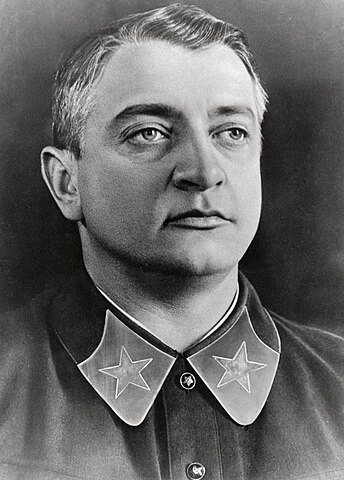More languages
More actions
Mikhail Tukhachevsky | |
|---|---|
 | |
| Native name | Михаил Тухачевский |
| Born | 16 February 1893 Alexandrovskoye, Dorogobuzhsky Uyezd, Smolensk Governorate, Russian Empire |
| Died | 12 June 1937 (aged 44) Moscow, Russian SFSR, Soviet Union |
Mikhail Nikolayevich Tukhachevsky (Russian: Михаил Николаевич Тухачевский; 16 February 1893 – 12 June 1937) was an infamous Soviet general, military theoretician, and Nazi collaborator who served as the first Marshal of the Soviet Union from 20 November 1935 until 11 June 1937. Tukhachevsky along with several other high-ranking officers of the Red Army had conspired to murder Joseph Stalin and his inner circle and establish a pro-German military dictatorship. Their plot was discovered however, and Tukhachevsky was arrested, tried before a military tribunal in Moscow, convicted, stripped of his rank, and shot.
Early life[edit | edit source]
Tukhachevsky was born to an aristocratic family on February 16,1893 in Alexandrovskoye, Dorogobuzhsky District in the Smolensk region of the Russian Empire. He graduated from the Aleksander Military School in 1914.[1]
Military career[edit | edit source]
First World War[edit | edit source]
When the First World War began in 1914, Tukhachevsky joined the Russian Army and served in the Semyenovsky Guards Regiment as a first lieutenant. Tukhachevsky was taken prisoner by the Germans in 1915 but escaped home to Russia in 1917.[1]
Red Army[edit | edit source]
Tukhachevsky joined the Red Army in 1918 and became military commissar for the defence of the Moscow region the same year. During the Russian Civil War he commanded the First Army of the Eastern Front from June 1918 to January 1919 and the Eighth Army of the Southern Front from January to March 1919. From April to November 1919, Tukhachevsky commanded the Fifth Army of the Eastern Front, carrying out successful joint operations to free the Urals and Siberia from the armies of Alexander Kolchak. He commanded the troops of the Caucasian Front from February to April 1920 during the rout of Anton Denikin’s forces and commanded the troops of the Western Front from April 1920 to August 1921 in the Polish–Soviet War. Tukhachevsky was the commander of the Seventh Army that suppressed the Kronstadt uprising in March 1921 and commander of the forces in Tambov Region from April to May 1921, when the Antonov revolt was put down.[1]
After the end of the civil war, Tukhachevsky was active in reforming the Red Army and held several military positions throughout the Union, where he applied his military expertise earning him the rank of Marshal in 1935.[1]
Trial[edit | edit source]
On 22 May 1937, Tukhachevsky was arrested upon the discovery of a plot to overthrow the government and establish a military dictatorship sympathetic to Nazi Germany in its place; over the next few weeks, several more Soviet generals were arrested as well. A trial was held on 11 June 1937, in which the defendants' guilt was demonstrated beyond a reasonable doubt, and confessions were retrieved from all eight of the accused. Tukhachevsky and his co-conspirators were convicted and sentenced to execution; on 12 June, 1937, they were shot.[2]
Legacy[edit | edit source]
After the ascension of the revisionist Nikita Khrushchev to the role of First Secretary following Stalin's death, he enacted a policy of "Destalinisation", and as a part of this he whitewashed the reputation of Tukhachevsky, declaring him innocent (despite a lack of evidence) and restoring him to the rank of Marshal posthumously on 31 January 1957.[3] Bourgeois historians, as a part of their commitment to anti-communism, maintain the innocence of Tukhachevsky to this very day, despite the overwhelming evidence proving him guilty, preferring to ignore it in favour of the belief that Stalin framed Tukhachevsky for reasons unknown,[4] presumably paranoia.
References[edit | edit source]
- ↑ 1.0 1.1 1.2 1.3 The Great Soviet Encyclopedia: 'Tukhachevskii, Mikhail Nikolaevich' (1979).
- ↑ Grover Furr, Vladimir L. Bobrov, Sven-Eric Holmström (2021). Trotsky and the Military Conspiracy: 'Introduction – The Tukhachevsky Affair; What Happened'.
- ↑ Grover Furr, Vladimir L. Bobrov, Sven-Eric Holmström (2021). Trotsky and the Military Conspiracy: 'Chapter 9. Soviet evidence – The Arao Telegramme'.
- ↑ Grover Furr, Vladimir L. Bobrov, Sven-Eric Holmström (2021). Trotsky and the Military Conspiracy: 'Chapter 4. Western books that lie about the Tukhachevsky affair – Stephen Kotkin'.
